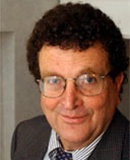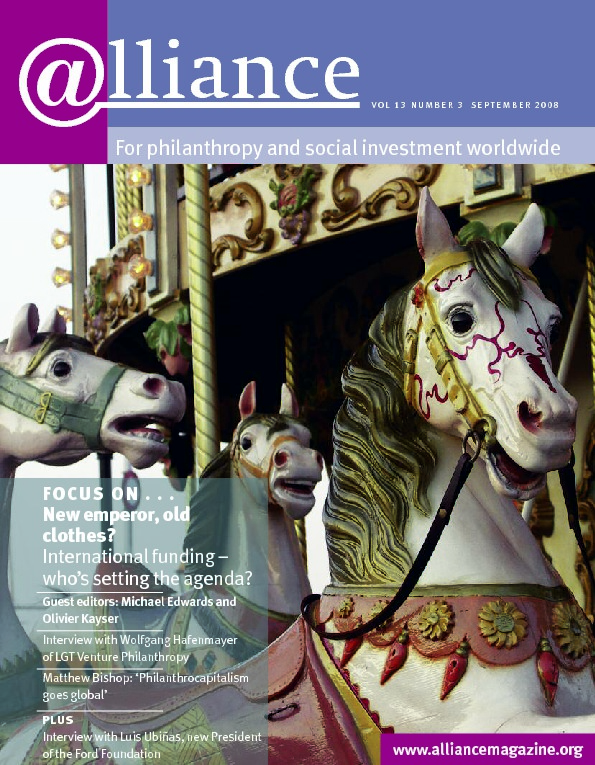In the for-profit world, companies getting information about a competitor’s plans and copying its products is in many cases illegal. In the non-profit world, every organization that does this should get a reward, in my view. Facing limited resources and a long list of worthy causes, organizations working for the common good must learn from others and cooperate in order to increase their impact and efficiency.
Reinventing the wheel is the one thing we just can’t afford any longer. After a decade of supporting international philanthropic networks in order to promote the development of philanthropy in Germany, the Bertelsmann Stiftung is now focusing on the non-profit sector more widely.
Going beyond what we know and learning from the best in the world has been the principle guiding the Bertelsmann Stiftung from its very beginning. My father, Reinhard Mohn, always taught us to get in contact with those who were the best in their fields – in the business world and the non-profit world alike.
Back in the 1990s, the legal structure and societal potential of foundations was largely unknown in Germany. That is why we sought the exchange of ideas with international foundations. Very soon it became clear that not only the Bertelsmann Stiftung, but the German foundation sector as a whole, could learn from their knowledge and experience. Impressed by the lively community of foundations in the Anglo-American world and their role in shaping society, the decision was made to help foster a similar trend in Germany.
The beginnings of cooperation
Very practically oriented, my father helped to establish the first German community foundation in our home town, Gütersloh, after studying community foundations in the US. The Philanthropy and Foundations Division was set up within the Bertelsmann Stiftung. The objective: to promote the idea of foundations in Germany and in Europe more widely. In 1999, we started the Community Foundation Initiative (Initiative Bürgerstiftungen) in Germany as a joint project with the Klaus Tschira Stiftung, the Körber Stiftung, the Charles Stewart Mott Foundation and the Association of German Foundations (Bundesverband Deutscher Stiftungen) in order to disseminate key information on founding and managing community foundations.
Also in 1999, the Transatlantic Community Foundation Network was established with the support and advice of the Mott Foundation, while the International Network on Strategic Philanthropy was started in cooperation with Atlantic Philanthropies, the German Marshall Fund of the United States, the Ford Foundation, King Baudouin Foundation and the Mott Foundation. Behind all these networks was a belief in learning from each other and developing an international working alliance. In the years that followed, we were able to provide not only information on the management and governance of foundations, but also practical tools for individuals and institutions to help promote the idea of foundations to a broader audience.
Growth of the German foundation sector
Since the 1990s the foundation sector in Germany has experienced a veritable boom. In 1996, there was only one German community foundation. A dozen years later there are more than 230. The number of private foundations set up each year is constantly increasing. In 1996, 411 new foundations were founded; the corresponding figure for 2007 was 1,134. And there are signs that this trend will continue. Despite the worldwide financial turbulence, private wealth in Germany is at an all-time high and is increasingly dynamic: every year approximately €200 billion passes from one generation to the next. Looking at the rate of asset formation, it is reasonable to predict that we will have plenty of potential founders and committed citizens who will be willing and able to support foundation work in the future.
But in Germany, foundations contribute less than 1 per cent to the overall financial capacity of the non-profit sector. While there are now 16,000 foundations in Germany, there are over 550,000 associations and initiatives in total, all of them working for the public good. In addition, more than 12,000 municipalities have their say in German social reality.
Changing the focus
In 2007, the Bertelsmann Stiftung decided to shift its focus. Having benefited so much from the experience and insights of other foundations, it made a decision to concentrate on enabling cooperation and synergies across the entire German non-profit sector. It would do this by providing more transparency on best practice in various fields and promoting collaboration and partnerships between organizations working for the same goals.
Pooling knowledge is the most important thing in our view. I totally agree with Diana Leat, writing in the December 2008 edition of Alliance: ‘In many cases the problem is not so much lack of money as lack of knowledge – we simply do not know how to do it.’ Our answer is: despite the relatively small dimensions of the foundation sector, who else but foundations could provide neutral, well-funded, non-partisan platforms for learning and cooperation within the non-profit world? During the last two years, we have had very promising results with cross-sector conferences, where we systematically encourage and enable non-profit organizations, government bodies and social investors to share experiences and to start new partnerships. The transfer of knowledge and the networking of stakeholders committed to specific fields take centre stage here.
The greatest opportunity for philanthropic leverage
One new thing we are doing is publishing research reports for social investors in Germany on various fields of philanthropic action to demonstrate where and how giving produces maximum impact. In addition, selected charities are portrayed to give examples of good practice. Here again, we have benefited greatly from the knowledge of other organizations. Our work is based on the experiences of Britain’s New Philanthropy Capital (NPC) with its long tradition in analysing societal needs, fields of social action and charities.
We also try to make the most of the good ideas and successful projects we find. In order to facilitate the spread of innovations in the social sector, the Bertelsmann Stiftung, in cooperation with the Association of German Foundations, is seeking to establish guidelines that will help practitioners and social investors to identify and implement replicable projects and to share their experience in the transfer processes. The underlying conviction here is that systematic replication of successful methods, change parameters and social problem-solving concepts can help to leverage resources more effectively and thus to achieve greater impact.
In my view this is the greatest opportunity for philanthropic leverage. Facing overwhelming financial challenges to the non-profit sector and the public purse alike, it is high time to scan the field anew for powerful and lasting collaborations.
Brigitte Mohn is a member of the Executive Board of the Bertelsmann Stiftung. Email Brigitte.Mohn@bertelsmann.de
 Comment Barry Knight
Comment Barry Knight
One of the great benefits of large charitable foundations is their freedom. So long as they stay within the law, they can choose what they want to work on and where. A downside of this freedom is that they can change their priorities at short notice, leaving the problems they were tackling unsolved and their partners high and dry.
We saw the harmful consequences of this in Central and Eastern Europe during the 1990s. Charitable foundations rushed into the new democracies, abandoning their previous priorities, throwing copious amounts of money at emerging non-profit organizations, and distorting civil society in the process. After a few years, they moved on, leaving only a few stalwart foundations to continue the work. This fly-by-night approach is no way to address deep-seated problems in the world. No one will complain because no one wants to offend the funder, and the foundation is under no pressure to be accountable to its partners for its actions.
At least with the Bertelsmann Foundation moving on, you can say that they have made a major contribution to the field and left behind a successful community foundation sector in Germany. I have re-analysed data from the five Community Foundation Global Status Reports since 2000 and found that, on average, 70 new community foundations form each year, so that the total across the world now exceeds 1,400. Three factors have driven this growth: a cadre of capable and committed individuals, strong and effective infrastructure support organizations, and the long-term investment by a small number of foundations, including the Bertelsmann Foundation. It is clear that the community foundation field has potential to become a standard instrument of international development, but to realize this it will need more investment and more funders. So Bertelsmann will be missed.
Turning to the new area of interest for the Bertelsmann Foundation, the non-profit sector, this comes at a point when interest in this area of work is on the wane. Many foundations have lost their enthusiasm because they feel that ‘civil society’ is too general a category and that the benefits from such support are not clear. In fact, non-profits across the world have not made the necessary strides to demonstrate their efficiency and effectiveness.
So it was with excitement that I read that the Bertelsmann Foundation is to give emphasis to ‘knowledge’. A CENTRIS study, The Value and Independence of the Voluntary Sector, published in 2007, concluded that it’s not so much that non-profits don’t know what to do; it’s that they are poor at codifying, managing and communicating their knowledge. Bertelsmann is superb at knowledge management and well placed to lead on it. German non-profits will indeed be ‘learning from the best’.
Barry Knight is Secretary of CENTRIS. Email barryknight@cranehouse.eu



Comments (0)